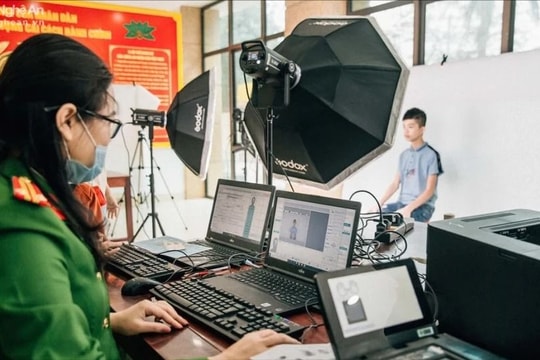From July 1, 2024, children under 14 years old will be issued an ID card if needed.
(Baonghean.vn) - The Law on Identification was passed by the National Assembly on November 27, 2023, and will take effect from July 1, 2024. According to this law, children under 14 years old, if needed, can make an identification card.
Colonel Luong The Loc - Head of the Police Department of Administrative Management of Social Order of the Provincial Police had an interview with Nghe An Newspaper reporters about issues of concern to the people.
PV:Could you tell us what is the purpose of changing the name from citizen identification card to identity card?
Colonel Luong The Loc:The renaming of the citizen identification card to the identity card is to be consistent with the names of the citizen information identification cards of countries in the world today (Idencity Card - Identity card or personal identification card). In addition, with the expansion and integration of more information into the identity card, the information on the card and the information integrated into the card is not simply basic information of the citizen as before.
The name change will ensure more comprehensiveness and will not affect people's psychology because Article 46 of the Law on Identification on transitional provisions also stipulates: Legal documents issued using information from identity cards and citizen identification cards remain legally valid; citizen identification cards prescribed in legal documents before the effective date of this Law are valid as identity cards prescribed in this Law. Thus, changing the name of citizen identification cards to ID cards will not affect state budget expenditures or social costs.
PV:Is the issued identity card or citizen identification card still valid? Besides the name, what are the notable new features of the identity card compared to the current citizen identification card?
Colonel Luong The Loc:Citizens who have CCCD cards issued before July 1, 2024 do not have to change to ID cards but can use them until the expiration date stated on the card. ID cards can only be used until December 31, 2024, regardless of whether they are still valid or expired.
In addition to the name, the ID card has many innovations compared to the current citizen ID card. In particular, the words "citizen ID" are changed to "ID", "hometown" are changed to "place of birth registration", "place of permanent residence" are changed to "place of residence". The ID card will no longer show fingerprints (left index finger and right index finger), the signature of the card issuer will be changed from the Director of the Department of Administrative Police for Social Order (C06) of the Ministry of Public Security to "Place of issue: Ministry of Public Security".
In addition, people under 14 years old from July 1, 2024 can be issued an ID card if needed, to ensure their legitimate rights and interests and serve state management. A completely new point compared to the old regulations in the CCCD Law is the addition of an ID certificate. This is an identity document containing information about the identity of people of Vietnamese origin whose nationality has not been determined, issued by the ID management agency according to the provisions of this Law.
From July 1, 2024, citizens will have electronic ID cards. The law also added regulations to collect iris biometric information for citizens aged 6 and over when carrying out ID card issuance procedures. DNA and voice biometric information is collected when people voluntarily…
Issuing ID cards to children is divided into two cases:
From 14 years old to under 16 years old: ID card is required
Under 14 years old: Not required, only issued if needed.
Depending on each case, the procedure for issuing ID cards for the two above-mentioned children will be different, specifically:
For children under 6 years old
When a child under 6 years old has not registered their birth: Connect with the birth registration procedure on the Public Service Portal/VNeID national identification application/directly at the identity management agency.
Note: This object does not collect identity and biometric information.
For children from 6 to under 14 years old:
This subject comes directly to the identity management agency with a legal representative to carry out procedures for collecting identification information and biometric information.
The procedure is carried out by the legal representative.
For children from 14 to under 16 years old
Step 1: Check and compare information in the National Database on population or specialized fields… to accurately determine the cardholder. If there is no information, it will be updated.
Step 2: Collect identification and biometric characteristics including facial photo, fingerprints, and iris of the person requesting an ID card.
Step 3: Check the information again, sign the identity information receipt form.
Step 4: Receive an appointment to return the ID card results and can request to return the ID card at another location if required and pay the delivery service fee.
- Processing time: 7 working days from the date of receipt of valid documents according to Article 26 of the 2023 Law on Identification.
PV:Regarding the information contained in the new ID card, could you please elaborate on how information such as DNA, iris, voice... will be collected?
Colonel Luong The Loc:Information on the ID card is specifically regulated in Article 19 of the Law on ID. In addition, Clause 2, Article 22 of the Law on ID also regulates information integrated into the ID card, including information on health insurance cards, social insurance books, driver's licenses, birth certificates, marriage certificates or other documents decided by the Prime Minister, except for information on documents issued by the Ministry of National Defense.
Thus, the information on the ID card, in addition to the information about the identity, also supplements and integrates other information. The use of information integrated into the ID card has the same value as providing information or using documents containing that information in performing administrative procedures, public services, and other transactions.
Regarding the collection of biometric information such as DNA, iris, voice: Regarding iris biometric information, at point b, clause 1, Article 23, the Law on Identification stipulates the order and procedures for issuing identification cards, stating clearly that "The recipient collects identity information and biometric information including facial photos, fingerprints, and irises of the person requesting an identification card", thus the collection of biometric information will be collected by the identification management agency when citizens apply for an identification card.
Regarding DNA and voice biometric information, at Point d, Clause 1, Article 16 of the Law on Identification stipulates: DNA and voice biometric information is collected when people voluntarily provide it or when the criminal prosecution agency or the agency managing the person subject to administrative handling measures in the process of handling the case according to its functions and tasks conducts an appraisal or collects people's DNA and voice biometric information, then it is shared with the identification management agency to update and adjust the identification database.
Thus, the ID management agency will not collect biometric information on DNA and voice during the process of receiving ID card applications. The collection, updating and adjustment of biometric information on DNA and voice into the ID database is done through the connection and sharing of information between competent agencies with the ID management agency.
PV:Can you elaborate on the removal of hometown information, fingerprints, and identifying features on ID cards?
Colonel Luong The Loc:Removing information on hometown, fingerprints, and identification features on ID cards will make it more convenient for people to use ID cards, ensuring people's privacy; basic ID information of people will be stored, exploited, and used through electronic chips on ID cards.
The adjustment of the information "permanent residence" printed on the citizen identification card to "residence" printed on the identification card is to suit the reality because many people currently only have temporary residence, current residence or no permanent residence, temporary residence. With this regulation, all Vietnamese people will be eligible to be issued an identification card; all will have their rights guaranteed when having identification documents to carry out administrative procedures and civil transactions as needed.
PV:Thanks comrade!



